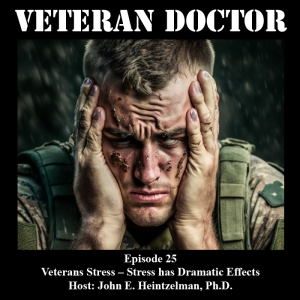
1.7K
Downloads
40
Episodes
This podcast is for anyone interested in Veteran-centric topics. Veterans have dedicated their lives to serving our country, so now it is our turn to serve them as they transition back into their civilian lives. One thing that has been discovered is that there is a lack of knowledge on the availability of resources and how to properly navigate the system upon exiting military service. This podcast's purpose is to help fill this gap of knowledge and guide veterans to the resources and information that they so deserve.
Episodes

Sunday Jul 11, 2021
Veteran Doctor - Episode 25 -Veterans Stress – Stress has Dramatic Effects
Sunday Jul 11, 2021
Sunday Jul 11, 2021
Good Morning Veterans, Family, and Friends, welcome back to the TWENTY-FIFTH EPISODE of the Veteran Doctor. On this week's episode, we will discuss Veterans Stress – Stress has dramatic effects on the Mind and Body.
As veterans, we are faced with different challenges as life gets back to somewhat of a normal pace again after COVID. Some of us are happy, while others are getting a little stressed and anxious. Stress is very powerful. We, as veterans, have dealt with different forms of stress throughout our lives. We should be experts, but all of us deal with stress differently. So, I would like to educate everyone on the effects of stress to help us understand it and potentially deal with it better when our lives get into those stressful moments.
So, there you are, sitting in traffic, late for a necessary appointment, watching the clock tick away. Your brain decides to release the stress hormones! These stress hormones trigger your body’s “fight or flight” response. Your heart races, you begin to breath more rapidly, and your muscles tense, ready for action. This response was designed to protect the body in the case of an emergency; however, as this response keeps firing day after day, it could cause severe risks to your health.
Stress is a natural reaction to many different life experiences. Everyone experiences and handles stress differently. Anything from work, school, or family to serious life events, a new diagnosis, war, or death can trigger stress. For short-term situations, stress can be beneficial by helping you cope with serious situations.
Although, if your stress response does not reset and these stress levels stay elevated, it can affect your health. Chronic stress can produce a variety of symptoms and affect your overall well-being, like irritability, anxiety, depression, headaches, and insomnia.
Central nervous and endocrine systems
One of the responsibilities of your central nervous system is the “fight or flight” response. The hypothalamus gets the ball rolling in your brain, telling your adrenal glands to release adrenaline and cortisol. These hormones speed up your heartbeat and send blood rushing to the areas of need, such as your muscles, heart, and other vital organs. When the perceived fear is gone, the CNS should return the body back to normal; however, if the stress doesn’t go away, the response will continue causing chronic stress. Chronic stress is also a factor in overeating, drug and alcohol abuse, and social withdrawal.
Cardio and Respiratory Systems
Stress hormones affect every aspect of our respiratory and cardiovascular systems. During a stress response, you breathe faster to distribute oxygen-rich blood to your body quicker. If you have prior breathing issues like asthma or emphysema, stress is going to make it worse. Stress hormones cause your heart to pump faster, which constrict your blood vessels and divert more oxygen to your muscles, so you will have more strength to react. This process also raises blood pressure. As a result, chronic stress will make your heart work too hard, too long. When your blood pressure rises, so does your risk of having a stroke or heart attack.
Digestive system
Under stress, the liver will produce extra blood sugar (glucose) to give you a boost of energy. If you are under chronic stress, your body may not be able to break down this extra glucose flood. Chronic stress may potentially increase your risk of developing type 2 diabetes. The body's increase in hormones, increased heart rate, and rapid breathing can also upset your digestive system. You are more likely to experience heartburn or acid reflux, thanks to an increase in stomach acid. Stress can also affect how food moves through your body, primarily leading to nausea, vomiting, stomachache, diarrhea, or constipation.
Muscular system
During stressful times, your muscles tense up to protect themselves from injury. Your muscles will release again once you relax, but if you are constantly under stress, your muscles may never get the chance to relax. Tight muscles cause back and shoulder pain, headaches, and body aches. Over time, this can cause secondary unhealthy issues of cycle-stopping exercise and turn to pain medication for relief.
Sexuality and reproductive system
Stress is extremely exhausting for both the body and mind. It is not unusual to lose your desire when you are under constant stress. In comparison, short-term stress may cause men to produce more male hormone testosterone, although this effect is not long-lasting if stress for long periods of time, a man’s testosterone levels can begin to drop. This can interfere with sperm production, cause erectile dysfunction, or even impotence.
Immune system
Stress stimulates the immune system. This stimulation helps in avoiding infections and healing wounds. But excessive stress hormones can weaken your immune system and reduce your body’s response to fight foreign invaders. People who experience chronic stress will become more susceptible to viral illnesses like the flu, common cold, and other infections. Stress can also drastically increase the time it takes you to recover from a disease or injury.
Managing your stress levels
We have established that chronic stress is terrible for us, but what is more important is how to realistically manage it properly.
Reorganize and Refocus. When stress increases, we are focusing on an event or situation that could or has gone wrong. Instead of focusing your attention on the negative aspects of these stressful events, take a step back and refocus. Train your mind to start thinking about things that can go positive. Every situation is only as stressful as our mind perceives it. If we can assess and reorganize our thoughts, then we can focus on what we can control. We are much less likely to become stressed.
Assign yourself reasonable goals. It is common for most people to take on more than they can handle. We think we can do it all. Truthfully, we all have our limitations. Assess the amount you can manage and recognize when it is beginning to feel like too much. It is fine to say “no” to some requests. If you feel like you cannot take on anymore, just say so! This helps to eliminate unnecessary stress and allow for time to relax!
Make and create time for yourself. Create enjoy at least one relaxing activity every day. This means make time and listen to music, read, or even just sit in a quiet room. These 15 to 30 minutes can help lower your stress levels and help you focus and think more clearly.
Get some perspective. Easier said than done! Especially when something negative has happened. However, a more important question to ask yourself: is this truly worth my attention? Try to focus on the positives and just move on. You need to spend your time on things that are important to you.
Exercise. Numerous studies have proven the benefits of managing stress with exercise. Try working out 30 to 60 minutes each day by performing any activity, whether weight training, yoga, pilates, cardio, etc. If this is too unrealistic for you, try these other options: (1) Park your car at the far side of any parking lot for a longer walk, (2) Take the stairs instead of the elevator, or (3) Bring in groceries one bag at a time.
So, I hope you enjoyed this information. Even if it may not pertain to you at the moment, there will be times that stress will affect you in one way or another. If not, share it with another Veteran who may be having some issues with stress. Anyway, have a good week, stay safe, and I will see you at the next week. Take Care!
REFERENCES:
Healthline.com (2021). The Effects of Stress on Your Body. Retrieved from https://www.healthline.com/health/stress/effects-on-body
Mannsfield, T. (2017). 5 Things you Can Do Before Stress Takes Its Toll. Core Life Eatery. Retrieved from https://www.corelifeeatery.com/5-things-you-can-do-before-stress-takes-its-toll/

No comments yet. Be the first to say something!